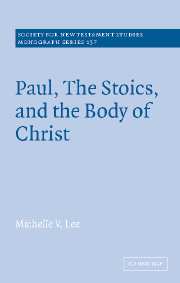1 - Introduction
Published online by Cambridge University Press: 23 November 2009
Summary
At first glance, Paul's words to the Corinthians about their being the body of Christ in 1 Cor. 12 seem simple and straightforward. He compares them with a human body so that they may be encouraged to work together, each member contributing to the good of the whole according to his or her special gift. However, the passage raises several critical questions which point to its deeper implications. Does Paul mean that the community is only “like” a body or is he saying that they are in some sense a real body? What is the significance of being specifically the body of Christ? Is the primary purpose of the passage to instruct on the correct use of spiritual gifts or is Paul also making a statement about the identity of the Christian community? The goal of this work is to present fresh answers to these questions by examining more closely the evidence from others who also spoke about the importance of being a body, specifically the Stoics, and how their conception of bodily unity was critical for social ethics. In doing so, I hope to shed new light on both the content and the purpose of Paul's description of the body of Christ in 1 Cor. 12 and also as it relates to the rest of his instructions in 1 Cor. 13 and 14.
- Type
- Chapter
- Information
- Paul, the Stoics, and the Body of Christ , pp. 1 - 26Publisher: Cambridge University PressPrint publication year: 2006



